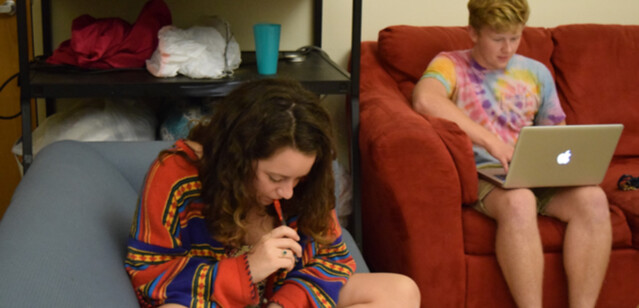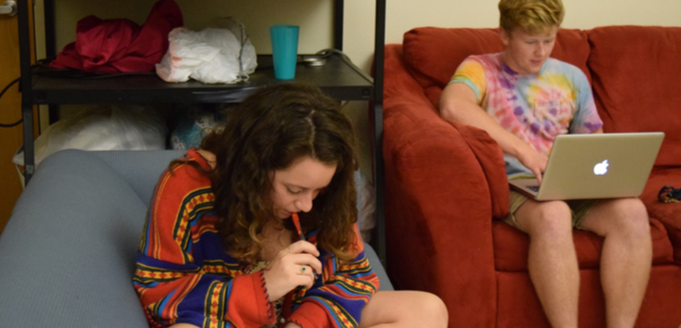
Though a majority of students know their campus Resident Advisors (RAs) and what responsibilities they take on, most are unaware of the underlying systematic struggles that RAs have faced over the past few years.
In addition to an increasing enrollment rate that alters the student to RA ratio, tensions between RAs and Professional Staff and inconsistencies in Resident Hall Director (RHD) positions have all contributed to conditions that can, at times, become overwhelming for RAs. The pressures put on RAs are so demanding that a support group was created at the CWC this year. Though the position requires hard work, patience and constant availability, most RAs believe that the benefits of the position outweigh the stresses.
The Daily Grind
RAs play a crucial role in ensuring the community’s well-being. Whether they are completing rounds of buildings, taking a shift “on duty” or planning events to raise campus morale, RAs must serve as role models and support the community at all times.
“RAs are in charge of overseeing the residence halls, maintaining their community and keeping the students safe,” thesis student and Senior RA Tessa Geier wrote in an email interview.
The amount of time and effort that RAs must put in on a daily basis certainly shows the demanding nature of the position. Though RAs get paid a stipend for 10 hours of work a week, the reality of the position requires each member to work much more time than that.
“In total, I would say at least 20 hours a week went to RA responsibilities, which does not reflect particularly busy weeks or emergencies,” Amanda Graff (’11) wrote. Graff was an RA from Fall 2013 to Spring 2015.
“As an RA, you are on and ready pretty much 24/7 in case you need to respond to problems and crises in the community,” Geier wrote.
“Most students aren’t aware of how much goes into the planning of programs and maintaining the community.”
RA events, for example, require ample amounts of planning and collaboration, and most students are unaware of how thoroughly planned these events are. RAs attempt to include four core values that they think residents will enjoy and benefit from: skill, connectedness, creativity and responsibility. While the events aim to incorporate these four values, they manifest in a variety of different forms.
“There are RA events that are just for fun, programs that educate on an important topic, raise awareness for issues such as diversity or sexual health, and events that build relationships in our communities,” Geier wrote.
In addition to hosting community events, RAs must help prepare campus for Fall opening and Spring closing. The range of responsibilities that RAs must perform throughout the year creates a strong need for teamwork and cooperation between members.
“The RA group is one big family and we work as one big team,” Geier wrote.
But Now We’re Stressed Out
The everyday demands of being an RA surely contribute to the overall stress that accompanies the position, but a large amount of this stress derives from emotional labor. Whether handling roommate mediations, performing wellness checks or acting as first responders to crisis situations, RAs have to deal with conflicts that require strong problem-solving skills and hours of training.
“I think an important thing to realize is that across the nation, and at New College in particular, the emotional labor that is being demanded of RAs in increasing tremendously,” Kaylie Stokes (’12) wrote. Stokes graduated this past May and served as an RA for a total of five semesters.
The increased emotional labor stems from the fact that New College is the only public Florida university or college where student staff members are trained and expected to perform wellness checks.
Because of its rigorous academic and social atmosphere, NCF is a stressful environment for many students. As a result, numerous students seek mental health services on campus and that support often involves RAs.
“I remember one time last year during a particularly stressful time of the year, around spring mid-terms, RAs were asked to perform over 20 wellness checks in, I think, like three days,” Stokes wrote.
“Being an RA means you are going to be dealing with very serious situations like suicidal ideation, sexual assault and alcohol poisoning just to name a few. While it was a privilege to be a trusted responder to these kinds of situations, it can also take an emotional and mental toll.”
These conditions partly explain the creation of the RA support group at the CWC.
“It gives us a space to support each other in the struggles of maintaining our well-being and that of our residents,” Geier wrote. “The RA position requires you to not only deal with your own daily struggles, but also the problems of everyone else.”
Things Seem A Little Tense
In addition to the responsibilities and emotional labor of the position, tensions between RAs and Housing Staff have been reported.
“Over the past few years there have been increasing struggles between RAs and Professional Staff,” Stokes wrote.
“The difficult part of being an RA was not necessarily my work (though the housing staff my second year as an RA did a terrible job of train us); it was the tension between the staff and housing and administration,” Graff wrote.
These tensions are partly result of inconsistent staffing in professional positions. For example, Stokes was an RA for five semesters and had five different direct supervisors over that time.
“Having been an RA for most of my time at New College, I can say for a fact that morale on staff was at an all-time low during my time as an RA,” Stokes wrote.
“I know many RAs, especially my last year felt very underappreciated, taken for granted, and disrespected by professional staff. That, along with the increasing demands with no increase in pay or benefits was a big reason for past RAs not reapplying.”
This shift in ideology among experienced RAs is supported in that 15 out of 20 of the current RAs are second-year students joining the staff for the first time. In addition, many of last year’s RAs were graduating and couldn’t reapply, which partially explains why the number of new RAs was extremely high.
“I’m pretty out of the loop about what’s going on with RA stuff this year, but I know that they hired Destinee Aponte who was a former RA to be one of the new RHDs and I would guess that has helped a lot with Student/Professional staff relations and that there are less misunderstandings and frustrations,” Stokes mentioned.
No Pain, No Gain
Though the working conditions that accompany the position prove to have some sort of effect on RAs, most argued that the benefits of the position outweigh the stress and emotional demand.
“Being an RA can get stressful at times but it is worth it,” Geier wrote.
“Serving as a role model and a support system for students, you feel the difference you can make in your community.”
It’s important to stress that, though RAs have a lot of responsibilities, no student should feel that they are a burden to their RAs or to avoid seeking out help or resources.
“Students take on the job of an RA because they care tremendously for students and the community,” Stokes wrote.
“It’s the responsibility of the Department of Student Affairs to make sure they are providing students what they need to be successful, healthy, and safe at New College and that includes an adequate number of RAs who aren’t overworked.”
One thing’s for sure: being an RA comes with a good deal of give and take. The position gives students the opportunities to lead and shape their community, help others and form new friendships in a collaborative setting.
“This year has been my favorite year yet. We work really well together and get along great,” Geier concluded.
Though the past few years have been difficult for RAs, conditions seem to be improving. For those interested in becoming RAs, realize what it takes: strength, patience, collaboration, creativity and so much more.

